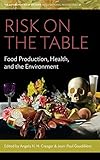Risk on the Table : Food Production, Health, and the Environment / ed. by Jean-Paul Gaudillière, Angela N. H. Creager.
Material type: TextSeries: Environment in History: International Perspectives ; 21Publisher: New York ; Oxford : Berghahn Books, [2021]Copyright date: ©2021Description: 1 online resource (366 p.)Content type:
TextSeries: Environment in History: International Perspectives ; 21Publisher: New York ; Oxford : Berghahn Books, [2021]Copyright date: ©2021Description: 1 online resource (366 p.)Content type: - 9781789209440
- 9781789209457
- online - DeGruyter
| Item type | Current library | Call number | URL | Status | Notes | Barcode | |
|---|---|---|---|---|---|---|---|
 eBook
eBook
|
Biblioteca "Angelicum" Pont. Univ. S.Tommaso d'Aquino Nuvola online | online - DeGruyter (Browse shelf(Opens below)) | Online access | Not for loan (Accesso limitato) | Accesso per gli utenti autorizzati / Access for authorized users | (dgr)9781789209457 |
Frontmatter -- Contents -- Figures and Tables -- Acknowledgments -- Abbreviations -- Introduction -- PART I Objectifying Dangers -- CHAPTER 1 Salad Days: The Science and Medicine of Bad Greens, 1870–2000 -- CHAPTER 2 Radioactive Diet: Food, Metabolism, and the Environment, ca. 1960 -- CHAPTER 3 Poison and Cancer: The Politics of Food Carcinogens in 1950s West Germany -- CHAPTER 4 “EAT. DIE.” The Domestication of Carcinogens in the 1980s -- CHAPTER 5 Risk on the Negotiating Table: Malnutrition, Mold Toxicity, and Postcolonial Development -- CHAPTER 6 Contaminated Foods, Global Environmental Health, and the Political Recalcitrance of a Pollution Problem: PCBs from 1966 to the Present Day -- PART II Ordering Risks -- CHAPTER 7 Trace Amounts at Industrial Scale: Arsenicals and Medicated Feed in the Production of the “Western Diet” -- CHAPTER 8 Between Bacteriology and Toxicology: Agricultural Antibiotics and US Risk Regulation (1948–77) -- CHAPTER 9 Conflicts of Interest, Ignorance, Capture, and Hegemony in the Diethylstilbestrol US Food Crisis -- CHAPTER 10 Defining Food Additives: Origins and Shortfalls of the US Regulatory Framework -- CHAPTER 11 The Rise (and Fall) of the Food-Drug Line: Classification, Gatekeepers, and Spatial Mediation in Regulating US Food and Health Markets -- Afterword -- Index
restricted access online access with authorization star
http://purl.org/coar/access_right/c_16ec
Over the last century, the industrialization of agriculture and processing technologies have made food abundant and relatively inexpensive for much of the world’s population. Simultaneously, pesticides, nitrates, and other technological innovations intended to improve the food supply’s productivity and safety have generated new, often poorly understood risks for consumers and the environment. From the proliferation of synthetic additives to the threat posed by antibiotic-resistant bacteria, the chapters in Risk on the Table zero in on key historical cases in North America and Europe that illuminate the history of food safety, highlighting the powerful tensions that exists among scientific understandings of risk, policymakers’ decisions, and cultural notions of “pure” food.
Mode of access: Internet via World Wide Web.
In English.
Description based on online resource; title from PDF title page (publisher's Web site, viewed 25. Jun 2024)


